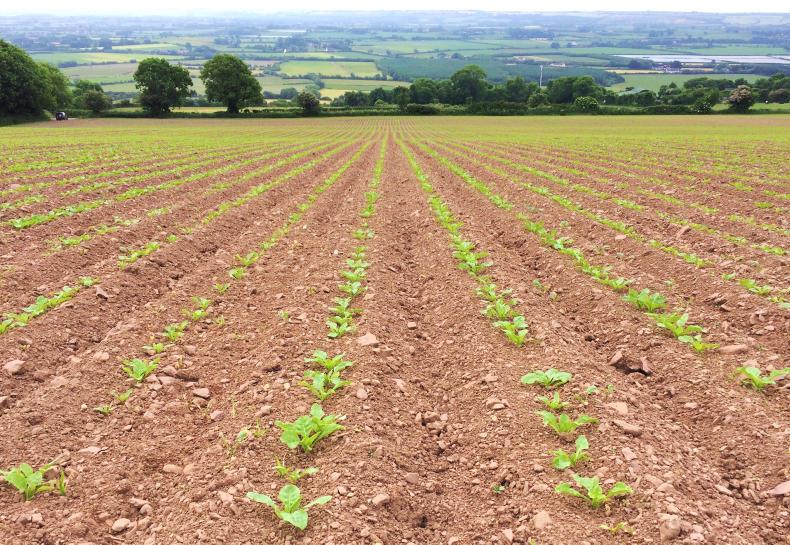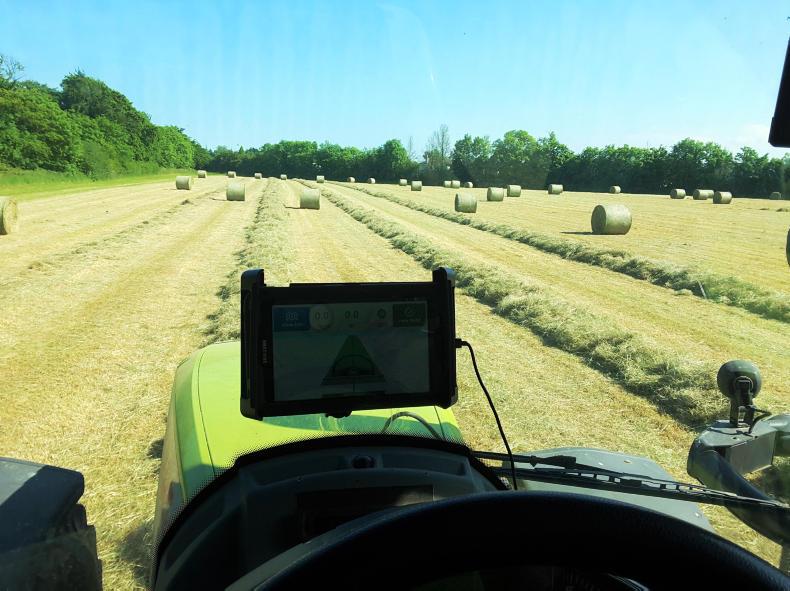The anticipated rainfall this week will be a welcome sight for many growers around the country whose crops are coming under pressure for moisture. This is the case for Meath grower Martin Hoste whose spring crops are currently under pressure. This could also soon be the situation for the crops of Cork-based Stephen Collins, while Derry-based Richard Kane’s heavier soils have proven their worth by retaining moisture during the dry weather.

Mogeely, Co Cork
What a month it’s been in Mogeely. The fine weather has meant that growers could catch up with work without the pressure of impending rain, which had been the theme of spring 2018 for this area.
A number of well-timed showers of rain on weekends meant crops grew enormously over the past four weeks.
Spring crop emergence was excellent and crops have tillered well, despite the shorter season.
Stephen is happy with his spring barley, given the time when it was sown, although crops in two later-sown fields are thin. At the four-leaf stage, most of the crops received a Cameo Max (45g/ha), Galaxy (0.75l/ha), Ninja (50ml/ha) and Mancozin (1.0l/ha) mix.
Crops currently range from GS30 to flag leaf emerged. They were brought up to 140kg to 155kg N/ha, depending on the crop. The majority of crops were sprayed with a T1 consisting of Siltra (0.5l/ha), Axial (0.25l/ha) and Adigor (1.0l/ha) last week. Disease pressure is low to moderate, but low levels of BYDV are present in fields.
His early-sown spring wheat is also doing well and with the flag leaf nearly fully emerged, a T2 will be applied this week. The crops were brought up to 150kg N/ha and have received a T1 of Elatus Era (0.7l/ha) and Bravo (1.0l/ha), as well as Axial (0.25l/ha) and Adigor (1.0l/ha).
Fodder beet emergence has been excellent and the crop has received its T2 herbicide of Debut (30g/ha), Betanal Maxxpro (0.8l/ha), Venzar (0.4l/ha), Goltix Flowable (0.5l/ha) and an oil at the six-leaf stage.
Gate closing on winter crops
The gate is closed on Stephen’s winter barley and the grains are filling well. His winter wheat is at the start of flowering and will received a T3 this week, consisting of Prosaro (1.2l/ha). The top three leaves are clean, but septoria hovers around the lower leaves. A T2 of Librax (2.0l/ha) and Bravo (1.0l/ha) was applied three weeks ago. Stephen’s winter oilseed rape has improved and appears to have bulked up since this time last month. “The weather has been in our favour and has compensated somewhat for the poor spring. The forecast of rain this week will be welcome provided it doesn’t forget when to stop.”

Limavady, Co Derry
The fine spell of weather was interrupted just twice in Limavady over the past five weeks. Two weeks ago, 35mm of rain fell in one hour and the same fell throughout the day a week before that. The moisture was timed perfectly to drive crops on.
Richard’s spring barley crops are generally in great condition, with the exception of later-sown crops, which are in need of more rain. His Planet feed and Scholar seed barley were topped off at 130kg N/ha two weeks ago and at GS30, the crops are now awaiting their T1 spray.
This will consist of Proline (0.5l/ha) and Bravo (1.0l/ha), as well as Maxi-Phi Activate (1.0l/ha) and Micro Boost (2.0l/ha). Richard will apply this in the next number of days and include Ally (21g/ha) and Pixxaro (0.3l/ha) for volunteer potatoes and a selection of other weeds which weren’t killed with previous herbicides, in part due to dry weather.
Disease pressure remains extremely low. Moisture pressure is not an issue, but some crops in the area on lighter ground are coming under pressure, explains Richard.
Spring oilseed rape flying
Having planted his Lumen oilseed rape six weeks ago, the crop is now at around mid-flowering.
Having received an application of slug pellets earlier in the year, slug pressure has reduced greatly.
Some crops received Galera (0.3l/ha) where weeds were present and he will apply Maxi-Phi Activate and Micro Boost, along with Pizarro (0.75l/ha) and Boron in the coming days.
His spring wheat received T1 a week ago of Proline (0.4l/ha), Chlmorquat (0.75l/ha) and Moddus (0.15).
Winter barley is variable due to the poor spring. “Where it’s good, it’s good; where it’s bad, it’s very thin,” he said. The crop received its final head spray of Siltra (0.5l/ha) and Proline (0.3l/ha) two weeks ago. The winter wheat is full of potential, explains Richard. Within the next 10 days, a head spray of Prizaro (2.0l/ha) will be applied. The petals have all fallen off his winter oilseed rape and the pods are filling well.
“There’s a long way to go with the spring crops yet. Some rain would do no harm. The winter crops are full of potential,” he added.

Clonee, Co Meath
With a total of 4.5mm of rain falling in the past three weeks, Martin can only describe the weather since his last From the Tramlines appearance as dry. As a result, spring crops are in need of rain, as moisture stress is becoming more evident.
Good seedbed conditions are really proving their worth this year, as crops which were sown in cloddy, rougher ground have been first to suffer. Crops which were sown in good seedbeds which have retained moisture are doing much better.
Martin’s Lynx beans were sown in two batches and the earlier-sown crops are now all starting to flower. Ten days ago, the crop received Chamine (0.75l/ha), Panarex (1.0l/ha) and Nuturmin (0.5l/ha), as well as an application of Magnite (3.0l/ha) and NovoK (2.0l/ha). The crops are clean, with no signs of chocolate spot, mildew or sclerotinia present.
Martin maintains spring crops are holding up well, despite the dry weather.
The crops are not as vigorous or advanced as last year, which he puts largely down to lack of water. However, they remain very clean.
He gave his Irena spring barley an extra 25kg of N to bring the total up to 175kg to 180kg N/ha. “We’re really pushing it, but we need the water,” explains Martin. With the awns peeping, the crops will receive its final spray in the coming week.
Driving winter wheat on
The winter wheat is doing very well, despite the dry conditions. The total N/ha was brought up to between 200kg and 250kg N/ha on his Graham and Costello winter wheat. The top three leaves are clean and the crop received its T2 spray two weeks ago consisting of Ceratavo Plus (0.65l/ha), Opus Team (1.0l/ha) and Stefonil (1.0l/ha), as well as Magnite and NovoK.
Winter oilseed rape remains a learning curve, but the crop also appears to have branched well. Earlier this month, the crop received an application of Chamine (0.75l/ha) and Prosaro (1.0l/ha), as well as Magnite and NovoK.
“Ideally if we got an inch and a half of rain, everything will benefit from it, especially the spring crops.”
Read more
Dry weather takes toll on crops across the world
From the tramlines: dry weather a concern in parts
Dryness a factor in many spring crops
The anticipated rainfall this week will be a welcome sight for many growers around the country whose crops are coming under pressure for moisture. This is the case for Meath grower Martin Hoste whose spring crops are currently under pressure. This could also soon be the situation for the crops of Cork-based Stephen Collins, while Derry-based Richard Kane’s heavier soils have proven their worth by retaining moisture during the dry weather.

Mogeely, Co Cork
What a month it’s been in Mogeely. The fine weather has meant that growers could catch up with work without the pressure of impending rain, which had been the theme of spring 2018 for this area.
A number of well-timed showers of rain on weekends meant crops grew enormously over the past four weeks.
Spring crop emergence was excellent and crops have tillered well, despite the shorter season.
Stephen is happy with his spring barley, given the time when it was sown, although crops in two later-sown fields are thin. At the four-leaf stage, most of the crops received a Cameo Max (45g/ha), Galaxy (0.75l/ha), Ninja (50ml/ha) and Mancozin (1.0l/ha) mix.
Crops currently range from GS30 to flag leaf emerged. They were brought up to 140kg to 155kg N/ha, depending on the crop. The majority of crops were sprayed with a T1 consisting of Siltra (0.5l/ha), Axial (0.25l/ha) and Adigor (1.0l/ha) last week. Disease pressure is low to moderate, but low levels of BYDV are present in fields.
His early-sown spring wheat is also doing well and with the flag leaf nearly fully emerged, a T2 will be applied this week. The crops were brought up to 150kg N/ha and have received a T1 of Elatus Era (0.7l/ha) and Bravo (1.0l/ha), as well as Axial (0.25l/ha) and Adigor (1.0l/ha).
Fodder beet emergence has been excellent and the crop has received its T2 herbicide of Debut (30g/ha), Betanal Maxxpro (0.8l/ha), Venzar (0.4l/ha), Goltix Flowable (0.5l/ha) and an oil at the six-leaf stage.
Gate closing on winter crops
The gate is closed on Stephen’s winter barley and the grains are filling well. His winter wheat is at the start of flowering and will received a T3 this week, consisting of Prosaro (1.2l/ha). The top three leaves are clean, but septoria hovers around the lower leaves. A T2 of Librax (2.0l/ha) and Bravo (1.0l/ha) was applied three weeks ago. Stephen’s winter oilseed rape has improved and appears to have bulked up since this time last month. “The weather has been in our favour and has compensated somewhat for the poor spring. The forecast of rain this week will be welcome provided it doesn’t forget when to stop.”

Limavady, Co Derry
The fine spell of weather was interrupted just twice in Limavady over the past five weeks. Two weeks ago, 35mm of rain fell in one hour and the same fell throughout the day a week before that. The moisture was timed perfectly to drive crops on.
Richard’s spring barley crops are generally in great condition, with the exception of later-sown crops, which are in need of more rain. His Planet feed and Scholar seed barley were topped off at 130kg N/ha two weeks ago and at GS30, the crops are now awaiting their T1 spray.
This will consist of Proline (0.5l/ha) and Bravo (1.0l/ha), as well as Maxi-Phi Activate (1.0l/ha) and Micro Boost (2.0l/ha). Richard will apply this in the next number of days and include Ally (21g/ha) and Pixxaro (0.3l/ha) for volunteer potatoes and a selection of other weeds which weren’t killed with previous herbicides, in part due to dry weather.
Disease pressure remains extremely low. Moisture pressure is not an issue, but some crops in the area on lighter ground are coming under pressure, explains Richard.
Spring oilseed rape flying
Having planted his Lumen oilseed rape six weeks ago, the crop is now at around mid-flowering.
Having received an application of slug pellets earlier in the year, slug pressure has reduced greatly.
Some crops received Galera (0.3l/ha) where weeds were present and he will apply Maxi-Phi Activate and Micro Boost, along with Pizarro (0.75l/ha) and Boron in the coming days.
His spring wheat received T1 a week ago of Proline (0.4l/ha), Chlmorquat (0.75l/ha) and Moddus (0.15).
Winter barley is variable due to the poor spring. “Where it’s good, it’s good; where it’s bad, it’s very thin,” he said. The crop received its final head spray of Siltra (0.5l/ha) and Proline (0.3l/ha) two weeks ago. The winter wheat is full of potential, explains Richard. Within the next 10 days, a head spray of Prizaro (2.0l/ha) will be applied. The petals have all fallen off his winter oilseed rape and the pods are filling well.
“There’s a long way to go with the spring crops yet. Some rain would do no harm. The winter crops are full of potential,” he added.

Clonee, Co Meath
With a total of 4.5mm of rain falling in the past three weeks, Martin can only describe the weather since his last From the Tramlines appearance as dry. As a result, spring crops are in need of rain, as moisture stress is becoming more evident.
Good seedbed conditions are really proving their worth this year, as crops which were sown in cloddy, rougher ground have been first to suffer. Crops which were sown in good seedbeds which have retained moisture are doing much better.
Martin’s Lynx beans were sown in two batches and the earlier-sown crops are now all starting to flower. Ten days ago, the crop received Chamine (0.75l/ha), Panarex (1.0l/ha) and Nuturmin (0.5l/ha), as well as an application of Magnite (3.0l/ha) and NovoK (2.0l/ha). The crops are clean, with no signs of chocolate spot, mildew or sclerotinia present.
Martin maintains spring crops are holding up well, despite the dry weather.
The crops are not as vigorous or advanced as last year, which he puts largely down to lack of water. However, they remain very clean.
He gave his Irena spring barley an extra 25kg of N to bring the total up to 175kg to 180kg N/ha. “We’re really pushing it, but we need the water,” explains Martin. With the awns peeping, the crops will receive its final spray in the coming week.
Driving winter wheat on
The winter wheat is doing very well, despite the dry conditions. The total N/ha was brought up to between 200kg and 250kg N/ha on his Graham and Costello winter wheat. The top three leaves are clean and the crop received its T2 spray two weeks ago consisting of Ceratavo Plus (0.65l/ha), Opus Team (1.0l/ha) and Stefonil (1.0l/ha), as well as Magnite and NovoK.
Winter oilseed rape remains a learning curve, but the crop also appears to have branched well. Earlier this month, the crop received an application of Chamine (0.75l/ha) and Prosaro (1.0l/ha), as well as Magnite and NovoK.
“Ideally if we got an inch and a half of rain, everything will benefit from it, especially the spring crops.”
Read more
Dry weather takes toll on crops across the world
From the tramlines: dry weather a concern in parts
Dryness a factor in many spring crops









 This is a subscriber-only article
This is a subscriber-only article











SHARING OPTIONS: